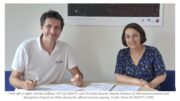CNES was at the Global Space Exploration Conference (GLEX 2017) co-organized by the International Astronautical Federation (IAF) and the Chinese Society of Astronautics (CSA) from Tuesday 6 to Thursday 8 June in Beijing. On this occasion, the agency met the China National Space Administration (CNSA) and the Chinese Academy of Sciences (CAS)
Co-organized by the International Astronautical Federation (IAF) and the Chinese Society of Astronautics (CSA), the GLEX 2017 conference, following on from GLEX 2012 held in Washington D.C., offers governments, space agencies, industry and entrepreneurs a high-level forum for debate, analysis and sharing of experience. Opened by Li Yuanchao, Vice-President of the Republic of China, this year’s event is bringing together for three days in Beijing more than 1,000 participants, including leading space officials from around the world.
On this occasion, CNES and IAF President Jean-Yves Le Gall warmly congratulated and thanked Lei Fanpei, President of CSA, and Yang Baohua, Vice-President of the China Aerospace Science and Technology Corporation (CASC), for hosting such a successful conference. He presented IAF’s 2016-2019 agenda, focusing on innovation as the right response in the shifting landscape being defined by NewSpace players and emerging space nations who are now challenging the established space powers, and underlined the importance of promoting diversity across the space sector by fostering the principles of 3G (Geography, Generation and Gender).
Jean-Yves Le Gall also met Tang Dengjie and Wu Yanhua, the Administrator and Vice- Administrator of CNSA, and Xiangli Bin, Vice-President of CAS, to review progress on the two French-Chinese satellite programmes, CFOSat (China French Oceanography Satellite), planned to launch in 2018, and SVOM (Space-based multiband astronomical Variable Objects Monitor), to be orbited in 2021.
The CFOSat mission, dedicated to gaining new insights into Earth’s climate, was recently distinguished with the France-China Joint Committee’s Innovation Prize and its forthcoming launch is set to take on added significance in the light of efforts to implement the Paris Agreement on climate. SVOM, meanwhile, will help scientists to delve deeper into the origins of the most energetic phenomena in the Universe.








Be the first to comment on "France-China space cooperation CNES meets CNSA and CAS at the GLEX 2017 Conference in Beijing"